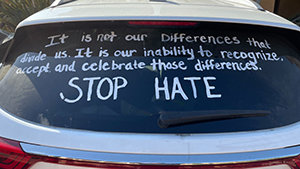
-
HOME
-
WHAT IS STANDOur Mission Our Values Our Help Contact
-
WHAT WE FIGHT FORReligious Freedom Religious Literacy Equality & Human Rights Inclusion & Respect Free Speech Responsible Journalism Corporate Accountability
-
RESOURCESExpert Studies Landmark Decisions White Papers FAQs David Miscavige Religious Freedom Resource Center Freedom of Religion & Human Rights Topic Index Priest-Penitent Privilege Islamophobia
-
HATE MONITORBiased Media Propagandists Hatemongers False Experts Hate Monitor Blog
-
NEWSROOMNews Media Watch Videos Blog
-
TAKE ACTIONCombat Hate & Discrimination Champion Freedom of Religion Demand Accountability
Check the Memo: Embracing Religious Diversity Is Good For Your Bottom Line
On the morning of March 25, 2024, two reporters walked into the Rainbow Terrace Adult Day Healthcare Center in Columbia, Maryland and were instantly pelted on all sides with colored powder. Yes, you can call it a food fight, but there was nothing mean-spirited about it.

March 25 was this year’s Holi, the Hindu festival of colors, celebrating the beginning of spring and the victory of good over evil. Held at the end of the final full moon day of the lunar month, Holi is based on the Hindu legend of Holika, a female demon who tries to kill her nephew Prahlad because he worships the Hindu god Vishnu. But Prahlad miraculously survives the burning fire even as the evil Holika herself perishes in the flames.
More and more companies, large and small, are recognizing the value of embracing the faiths of their clients and staff.
With the daycare center’s full support and encouragement, some three dozen seniors of Indian descent celebrate Holi. Dressed in traditional garb, the group begins their mischief at 9:30 a.m., throwing colored powder at each other and anyone within arm’s reach—attendants, visitors, unsuspecting guests. After an hour of pelting (which includes smearing each other’s faces), the group boards buses, also courtesy of Rainbow Terrace, which disembark at the nearby Shri Mangal Mandir Temple, a Hindu place of worship. There, they remove their shoes and participate in Garba, an Indian folk dance. Moving in a circle while clapping their hands, they chant and pray. They then return to the center for a traditional Indian meal before going home for the evening.
Jamese Douglas, a Methodist driver for Rainbow, has worked at the center for three years. Today, her face thick with colored powder, Douglas said she had learned a lot about religion from her Hindu friends and even picked up some words in their language. Differences among religions don’t amount to much, she feels. Even “Krishna” sounds like “Christ.”
What’s happening at the Rainbow Terrace Adult Day Healthcare Center is not an anomaly but a growing trend. More and more companies, large and small, are recognizing the value of embracing the faiths of their clients and staff. In fact, according to a study released by the Religious Freedom & Business Foundation (RFBF), 429 of the Fortune 500 companies—over 85%—now embrace religion as a central factor in their commitment to diversity.
Want to make it to the Fortune 500 list? Ask American Airlines, Google, Intel, Dell, PayPal, Texas Instruments, Target, Tyson Foods and AIG—all earning kudos for being faith-friendly. These companies and others have broadened their tents to include resources such as in-office chaplains of different faiths. They’ve also matched employee church donations and instituted protocols for granting religious accommodations or reporting religious discrimination in the workplace. Cedric Rockamore, American Airlines’ vice president of global people operations, said, “Our purpose is to care for people on life’s journey, including our customers and our 130,000 team members. Our team members, across all faiths and beliefs, help us better understand and serve our customers around the world.”
American Airlines ranked number one on the RFBF Fortune 500 faith-friendly list. Is it any surprise?
It and its fellow iconic corporations understand that it’s good for their bottom line to shun hatred and prejudice and embrace inclusion and diversity.
We Scientologists applaud this trend because religious diversity fosters a sense of belonging and respect among all faiths.
We also expect corporations to behave with the same decency and respect for others that we expect from our fellow humans. That includes embracing the diverse beliefs of their clients and staff and never betraying their trust by discriminating against or excluding their faiths.
It’s right there in the Code of a Scientologist—soldered into our character as a faith—where Scientologists pledge “To support the freedom of religion.”
And if a human being can do that, why shouldn’t a company?
It’s only human, right?









